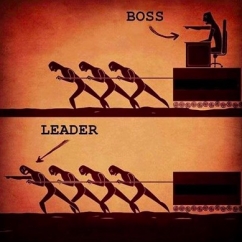Articles and News
Are You A Boss Or A Leader? October 08, 2014 (0 comments)

Merrick, NY—Managers dictate, leaders inspire.
It’s no secret that the tone of a workplace is set at the top. To build a culture of accountability throughout the organization, the senior leader must first set the example and be personally accountable. Without it, the organization devolves into a culture of distrust where employee compliance is forced for fear of consequences, rather than a culture where employees are eager to perform their best.
Paul LaRue, a management expert in the hospitality, health care and entertainment industries, writes that leaders who hold themselves as accountable as they hold employees will be rewarded with better employee engagement, a more cohesive team alignment, enhanced trust, and sharpened skills by working within a behavioral framework.
An article he authored on SmartBlogs.com offers simple and effective steps to become an accountable leader:
Willingness. The most important is to be a leader that allows themselves to be exposed to criticism, checks and balances, and take the full responsibility of their actions and intentions.
Having the correct intentions and perspective. If the leader’s values are aligned with that of the organization, they will have no hidden agendas and open themselves up to checks and balances.
Communicate your expectations for yourself to everyone. This creates a better culture of trust and in turn your people will want to be with a transparent leader who is willing to take valuable input from others.
Establish systems of checks and balances. One leader developed a process in which the department’s financials were reconciled by two of his subordinates. He informed everyone that because his predecessors fudged the books, he wanted everyone to know that he was above-board in this area. Simple systems or procedures make accountability a practice, not just an intention.
Set up a network of internal and external accountability partners. Internal accountability partners who see a leader’s daily actions can quickly identify when they are going off course. External partners will see things above any potential smokescreens and organizational blinders. A good leader has both who check on their integrity regularly.
Accept all feedback, correction, and consequences. Leaders who are thankful to learn and grow will not dismiss feedback they disagree with, but embrace it as an opportunity to improve.







